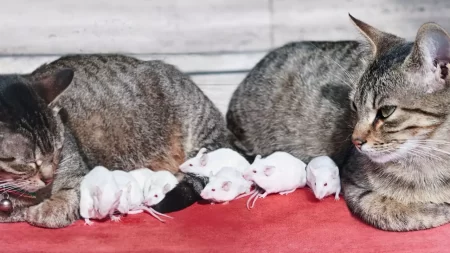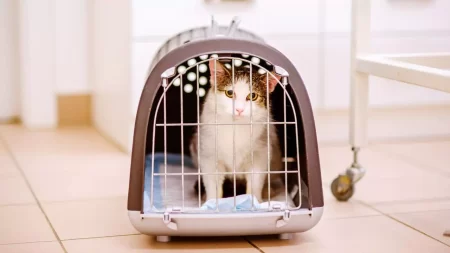Cats are notoriously independent creatures. While they form strong bonds with their owners, they are still prone to wandering off and exploring on their own. In some cases, this harmless behavior can turn into full-blown running away.
According to the American Humane Society, around 2.7 million cats go missing every year in the United States alone. If your furry friend has suddenly disappeared, it can be emotionally devastating.
Understanding the common reasons behind this phenomenon can help you either prevent it from happening or track them down if they do wander off. Here are seven of the scariest reasons why cats run away.
Scary Reasons Why Cats Run Away
Territory Control
Contrary to popular belief, cats are not entirely domesticated animals. They still have many innate wild instincts, including the desire to patrol and protect their territory. If your surroundings suddenly change with new furniture, scents, or people, it can make your cat feel like their turf is being invaded. This discomfort motivates them to venture off in search of a space to call their own. Introduce any changes slowly and provide them with vertical territory like cat towers.
Pain
Cats are masters at hiding discomfort and vulnerability. If your cat is suddenly distressed or in pain from an injury or illness, their natural response is to isolate themselves away from perceived danger. Don’t assume they are just being finicky. Schedule a vet visit to pinpoint any underlying medical issues. Cats also often wander off to pass away alone when reaching old age.
Mating
Intact male cats are driven by the primal need to mate. The promise of a female cat in heat nearby can entice them to escape the confines of home and not return for days. Spaying or neutering your cat eliminates this powerful urge to wander for breeding. Even fixed cats can still get lured away by the scent of the opposite sex.
Moving House
Moving homes ranks among the most traumatic experiences for cats. The unfamiliar setting overwhelms their senses and territorial instincts. Some may slip outside in desperation to get back to their previous home. Ease anxiety by keeping them confined in one room first and using synthetic pheromones. Gradually let them explore when they appear comfortable.
Lack of Food
Despite their hunting prowess, domestic cats still rely on their owners for their steady food supply. Insufficient calories or resources prompt them to venture farther out in search of their next meal. Stick to a consistent feeding schedule with adequate nutrition. Make sure multiple freshwater sources are always available both indoors and outside.
How to Prevent Cats from Running Away?
Ensuring a secure and stimulating environment
Cats crave vertical spaces, cozy hideaways, and interactive toys. Providing these outlets and modifying your home to be more cat-friendly reduces their urge to escape out of boredom. Invest in tall cat trees, scratching posts, and regular playtime.
Proper identification and microchipping
Collars with ID tags greatly increase the chances of a lost cat being returned. But cats can slip out of collars. Microchipping offers permanent identification that animal shelters and vets can scan if your pet turns up. Keep the registration information up-to-date.
Providing enough exercise and mental stimulation
A lack of activity frustrates your cat’s natural instincts to hunt, climb, and explore. Make sure they get daily exercise with wand toys and interactive play. Food puzzles also give their brain a workout. A tired cat is less likely to wander off.
Spaying/neutering
The relentless need to mate and roam for breeding opportunities disappears with spaying or neutering. Schedule this basic procedure as a kitten to curb wandering tendencies before they develop.
Regular veterinary check-ups
Routine wellness exams allow vets to address medical issues early before they prompt your cat to run away. Keep vaccinations and flea/tick prevention current as well.
What to Do if Your Cat Runs Away?
Searching the immediate area
As soon as you notice your cat is missing, thoroughly search your home and yard just in case they are hiding nearby. Shake their treat bag and check all their favorite nap spots. Ask neighbors if they have spotted your pet. Leave out familiar bedding and toys outside with your scent to draw them back.
Spreading the word
Post “Lost Cat” flyers and notices on neighborhood pages and vet offices. Social media is invaluable for getting the word out fast to local residents. Provide photos and try geo-targeting posts to reach those within a few miles. Offer a reward as an extra motivator.
Using social media and online platforms
Facebook groups, NextDoor, Craigslist, and PawBoost allow targeted lost pet alerts. Post details on physical characteristics, microchip info, last known location, etc. Follow up on any leads or sightings immediately before the trail goes cold.
Contacting local animal shelters and organizations
File a lost report with animal services and visit shelters frequently to check their stray intake. Vets, pet stores, and groomers may also scan strays for microchips. Report your missing cat to lost and found pet databases too.
Setting up humane traps
If your cat is still being spotted in the area, set baited and humane traps on your property to lure them back. Place familiar bedding inside alongside pungent food. Check traps frequently so you can free your cat before they panic.
Losing a beloved cat is extremely distressing. But understanding the common reasons behind their disappearing act can help you either prevent it or track them down. Always remember there is still hope of being reunited. Persistence and using every resource available greatly improves your chances. Don’t give up the search.







